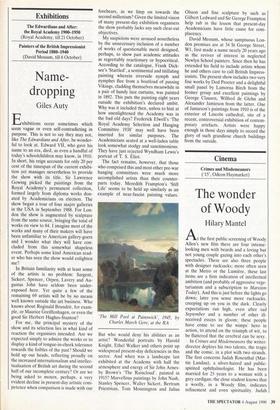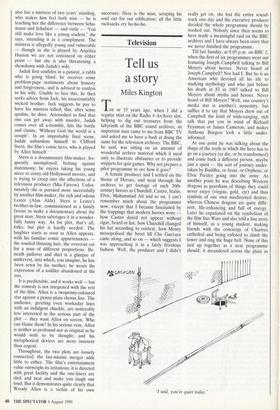Cinema
Crimes and Misdemeanors ('15', Odeon Haymarket)
The wonder of Woody
Hilary Mantel
At the first public screening of Woody Allen's new film there are four intense- looking men with beards and a loving but not young couple gazing into each other's spectacles. There are also three people with designer rucksacks; more often seen at the Metro or the Lumiere, these last items are a firm indication of intellectual ambition (and probably of aggressive vege- tarianism and a subscription to Marxism Today). And this is just before the lights go down; later you sense more rucksacks, creeping up on you in the dark. Clearly expectations run high, even after sad September and a number of other ill- received essays in gloom; these people have come to see the wimps' hero in action, to attend on the triumph of wit, to be flattered that the cerebral can be sexy.
In Crimes and Misdemeanors the writer- director deploys his two talents, the tragic and the comic, in a plot with two strands. The first concerns Judah Rosenthal (Mar- tin Landau), a silver-haired and public- spirited ophthalmologist. He has been married for 25 years to a woman with a grey cardigan; the close student knows that a woolly, in a Woody film, indicates refinement and even spirituality. Judah also has a mistress of two years' standing, who makes him feel both wise — he is teaching her the difference between Schu- mann and Schubert — and virile — 'You still make love like a young student,' she says, intending it as a compliment. The mistress is allegedly young and vulnerable — though as she is played by Anjelica Huston we are not convinced on either point — but she is also threatening a showdown with Judah's wife.
Judah first confides in a patient, a rabbi who is going blind; he receives some problem-page sentiments about honesty and forgiveness, and is advised to confess to his wife. Unable to face this, he then seeks advice from Jack, his unaccountably wicked brother. Jack suggests he pay to have his mistress killed; this, after some qualms, he does. Astonished to find that one can get away with murder, Judah comes over all a-tremble, hits the bottle and claims, 'Without God the world is a cesspit'. In an improbable final scene, Judah unburdens himself to Clifford Stern, the film's comic hero, who is played by Allen himself.
Stern is a documentary film-maker, fre- quently unemployed, fretting against matrimony; he enjoys taking his young niece to corny old Hollywood movies, and Is trying to creep into the affections of a television producer (Mia Farrow). Unfor- tunately she is pursued more successfully by another film-maker, the rich and odious Lester (Alan Alda). Stern is Lester's brother-in-law; commissioned as a family favour to make a documentary about the great man, Stern sabotages it in a wonder- fully funny way. As for plot, that's all, folks; but plot is hardly needed. The laughter starts as soon as Allen appears, with his familiar comic appurtenances — the tousled thinning hair, the overcoat cut for a man of different proportions. Be- neath pullover and shirt is a glimpse of undervest, into which, you imagine, he has been sewn by his mother; he wears the expression of a toddler abandoned at the zoo.
It is predictable, and it works well — but the comedy is not integrated with the rest of the film. Allen is a twopenny-coloured star against a penny-plain chorus line. The audience, greeting even workaday lines with an indulgent chuckle, are noticeably less interested in the serious part of the plot — they want Allen on screen. Who can blame them? In his serious vein, Allen is neither as profound nor as original as he would wish to be thought; and his metaphorical devices are more insistent than cogent.
Throughout, the two plots are loosely connected; the last-minute merger adds little to either. The film's entertainment value outweighs its irritations; it is directed with great facility and the one-liners are slick and neat and make you laugh out loud. But it demonstrates quite clearly that Woody Allen is a victim of his own successes. Here is the man, scraping his soul out for our edification; all the little rucksacks cry ho-ho-ho.

















































 Previous page
Previous page